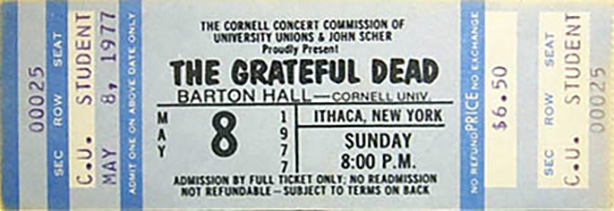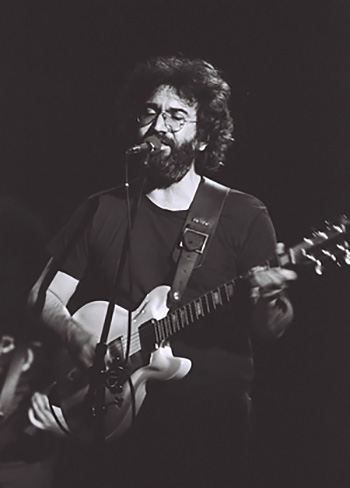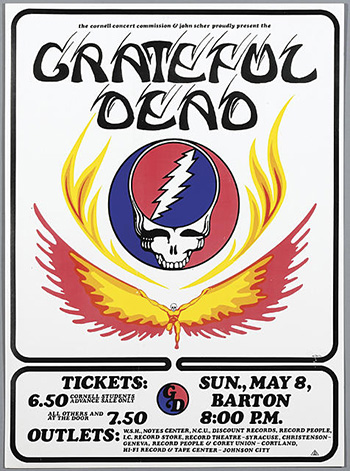
The Grateful Dead played three May shows at Barton Hall, in 1977, 1980 and 1981; a September 1978 show was planned but canceled.
How the Dead brought music on campus back to life
Imagine Cornell without music.

Guitarist Jerry Garcia is shown onstage with the Jerry Garcia Band in Bailey Hall during a 1975 appearance. Image provided by David Kwan '78.
In 1977, it seemed not only possible, but inevitable. A riot that broke out after a summer 1973 show by Deep Purple led to a strict crackdown on campus concerts. The Cornell Concert Commission was roughly $100,000 in debt, a legacy from money-losing performances years earlier, commission members say.
But members of the concert commission had a plan. They partnered with a professional music promoter who was willing to absorb losses, and share profits. Together, they brought the Grateful Dead to Barton Hall for Springfest in May. That show, on May 8, 1977, not only became part of Grateful Dead lore as one of the band's all-time finest performances, it helped preserve the viability of having concerts on campus.
"It's the story of a bunch of students who really wanted music on their campus and figured out a way to do it," author Peter Conners says of the book he is writing about the iconic Dead show, "Cornell '77," to be published by Cornell University Press (CUP) next year. "The Grateful Dead helped them turn the corner."
Seeking all that's still unsung (*) If anyone has photos, memorabilia or anecdotes from the night of the Grateful Dead's Barton Hall concert on May 8, 1977, please contact University Archivist Evan Earle at efe4@cornell.edu. (* lyrics from "Attics of My Life") |
The Cornell Concert Commission recently transferred its records on the Dead show to Cornell University Library. Conners searched that archive, but so far, has found only three photographs of the show -- as of now, the only known pictures from a performance widely regarded as one of the best of the Grateful Dead's nearly 3,000-concert, 30-year career.
"I suspect since it is relatively recent history, some of this memorabilia might still be living in alumni basements and attics rather than here in the University Archives," says University Archivist Evan Earle '02, M.S. '14.
The records from the Grateful Dead concert form the beginning of a new collection in the archives, documenting the history of the Cornell Concert Commission and major performances at Cornell.

The May 1977 Grateful Dead Barton Hall concert poster was designed by Jay Maybrey '77.
"We are excited to preserve this, and if folks have material from Cornell concerts, we would like to hear about it," Earle says.
The Dead show, widely known to Deadheads simply as "Cornell '77," came between back-to-back shows in Boston, Connecticut, and Buffalo. Fronted by Jerry Garcia, the band played 19 songs over two sets in Barton Hall, before closing with "One More Saturday Night." Adding to the aura, concertgoers emerged from Barton into a freak early May snowstorm.
"It sounds like a small detail, but almost everyone I've spoken to who went to the concert mentions it," Conners says. "They went in with no snow, came out and it was snowing. And it was such a wonderful concert, the snow sort of added to the magic of the whole experience."
Many in the audience – composed of itinerant Deadheads, students and fans from the region – regarded it as a great show, but its legend grew over time, thanks to high quality audiocassettes passed around by fans, with the blessing of the band. In 2012, a recording of the concert was inducted into the Library of Congress' National Recording Registry.
The show's significance in American history, as well as Cornell history, is what made Cornell University Press decide to publish a book about it, timed to the concert's 40th anniversary next year.
"Our [then] incoming director, Dean Smith, mentioned the Barton Hall show in conversation and I knew right away that we had a great Cornell story and an important American story to explore," says Michael McGandy, CUP senior editor. "The fact that Dean is a big Deadhead helped me immensely in developing the plan for the book with Peter. Whenever I had a question of fact or Dead lore, Dean was ready with the answer."
Conners is the author of several books, including "Growing Up Dead," his 2009 memoir of his life as a Grateful Dead fan. He says the role of the band in American culture is part of what makes the Dead, and the show, so significant.
"It wasn't just a concert," Conners says. "The Grateful Dead was more than a band. They really embodied a community. A lot of people think of them as embodying the values of the 1960s – and at best, that is what the community was like, and I think Cornell brought that out."
Melanie Lefkowitz is a staff writer and editor at Cornell University Library.